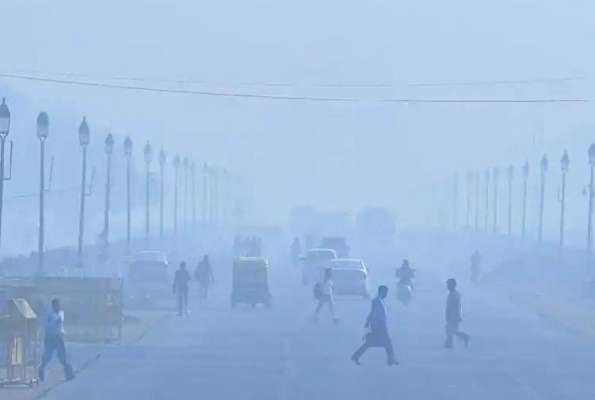Delhi's air quality remains 'severe' for 2nd day on trot

New Delhi: The national capital's air quality remained severe for the second consecutive day on Friday, while government agencies said it is likely to improve slightly.
Experts said while meteorological conditions were moderately favourable for dispersion of pollutants, a very high number of farm fires in Punjab was the primary reason for the severe air quality on Friday.
The city's 24-hour average air quality index (AQI) stood at 406. On Thursday, the AQI was 450, the highest since November 15 last year, when it was 458.
The neighbouring cities of Faridabad, Ghaziabad, Noida, Greater Noida and Gurugram also recorded very poor to severe air quality.
An AQI between zero and 50 is considered "good", 51 and 100 "satisfactory", 101 and 200 "moderate", 201 and 300 "poor", 301 and 400 "very poor", and 401 and 500 "severe".
PM10 levels in Delhi-NCR stood at 435 microgram per cubic meter ( g/m3) at 6 pm, according to CPCB data. PM10 levels below 100 g/m3 are considered safe in India.
PM10 is particulate matter with a diameter of 10 micrometers and is inhalable into the lungs. These particles include dust, pollen and mold spores.
The levels of PM2.5 finer particles which can even enter the bloodstream were 242 g/m3 at 6 pm. PM2.5 levels up to 60 g/m3 are considered safe.
According to the India Meteorological Department (IMD), the maximum wind speed was 10 kilometres per hour on Friday and the minimum temperature 11.2 degrees Celsius. Calm winds and low temperatures trap pollutants close to the ground, while favourable wind speed helps in their dispersion.
V K Soni, the head of IMD's environment monitoring research centre, said, The air quality was in the 'very poor' category on Friday morning. It entered the 'severe' zone again by evening, with a very large number of farm fires over Punjab being the primary reason .
He said the boundary layer wind direction was north-northwesterly, favourable for the transport of pollutants from farm fires to Delhi-NCR.
The Air Quality Early Warning System for Delhi said the farm fire count in Punjab (around 5,100) remained very high on Thursday and it is likely to impact the air quality of Delhi-NCR and other parts of northwest India.
The Ministry of Earth Sciences' air quality monitor, SAFAR, said the share of stubble burning in Delhi's PM2.5 pollution was estimated at 21 percent on Friday. It was 42 percent on Thursday, the maximum this season so far.
Last year, the stubble contribution to Delhi's pollution had peaked to 44 percent on November 1, according to SAFAR data.
Health experts said during the COVID-19 pandemic, air pollution has become a serious health concern for about the two crore residents of the national capital.
According to a doctor at the Sir Ganga Ram Hospital, intake of every 22 micrograms per cubic metre of polluted air is equivalent to smoking a cigarette.
With Delhi witnessing a spike in the number of new COVID-19 cases amid worsening pollution levels, the Delhi government on Thursday announced a blanket ban on firecrackers from November 7 to November 30.
Delhi Environment Minister Gopal Rai said those violating the ban on firecrackers can be fined up to Rs 1 lakh by the administration.















































